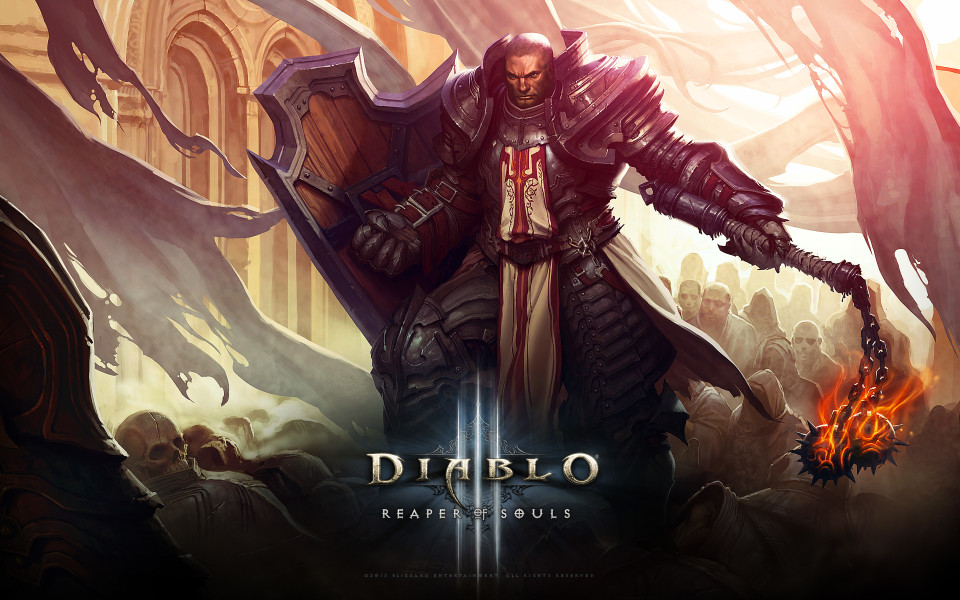Quick shout out before I get on with the rest of the blog post: in keeping with my resolution to get out and play games in meat space more often, I made it to Commander night at my local FLGS this evening. Troy and DJ – it was great gaming with you guys. You really made me feel welcome and I had a ton of fun. -Peter
I’m about 3 years late to the Diablo III party. I’m about 16 years late to the Dresden Files party. Ah well. Better late than never. In starting to consume both at the same time, however, I noticed something: Diablo III has a fair bit to say about Paladins, and I think some of it is really useful for making an oft-maligned class actually fun and interesting in games.
First some quick background, though. The self-righteous, overly-zealous, utterly inflexible, or otherwise just plain insufferable paladin is a stereotype as old as the proverbial hills in gaming. A lot of the time, paladins in fantasy games act a bit like Space Marines in the Warhammer 40k universe: violent, loud, and constantly spouting terms like “heretic,” “smite,” and “cleanse.” While this can be fun for a certain type of game, the perception has crept in that this is the “right” or even only way to play holy warriors, and, well, that’s just not true.
Diablo III, of all things, quietly hangs a lampshade on this. I played my first run through the game as a Crusader, the “Paladin” class of the game – a big brawny guy encased in armor and using a shield and an enormous weapon. Early in the game, you recruit a Templar as a companion – and at that point, the contrasts become evident. The crusader comes from an order that revolves around mentoring a single apprentice who takes everything from the mentor – including their name – when they die. In addition, the Crusader is a fairly calm, soft-spoken, and even-handed sort. The Templar, on the other hand, is more the Space Marine archetype. Loud, wrathful, zealous, and a little unstable. Where the Crusader seems to look at all the fighting he has to do with a kind of patient resignation, the Templar revels in violence and seems to be constantly chomping at the bit to get back into the fight. And his order took him as a criminal and basically tortured him until he forgot his past life, then rebuilt him as they saw fit. The Crusader is audibly disturbed by this and tells the Templar “they left you empty, friend.” And then there’s Michael Carpenter, the Knight of the Cross from The Dresden Files. Michael is a family man – a married father of several children – who still goes out and risks his life fighting supernatural evil because it’s the right thing to do. He is kind, patient, and when tries to correct the behavior of others (particularly Harry) it’s done in such a way that makes it obvious that he’s saying something because he cares – not just about the ambient moral purity of the world, but about the life of his friend and the quality thereof. He prompts Harry to be a better person at least in part to make Harry’s life fuller and more meaningful.
Two other fictional characters also go well into the mix: Nick Valentine, the detective from Fallout 4, who in the middle of a pitched battle will shout things like “Are you sure this is the last mug you want to see?” and “This doesn’t have to be the day you die!” even as he’s ducking for cover and returning fire (and so many other things that I won’t spoil), and the Paragon variant of Commander Shepard from the Mass Effect trilogy, who despite being a person with an unbelievable amount of responsibility piled on him, still finds time to talk a distraught former slave down from hurting herself, comfort a grieving mother in a lawless slum, and heal a criminal dying of a terminal disease who just seconds before had cursed him and waved a gun in his face. These kinds of multi-faceted good people who actually embody the description of love Paul gives in 1 Corinthians 13:4-7 not only are more tolerable for other players at the table, but they’re ultimately more interesting characters. They’re also much more authentic and believable paragons of virtue than a lot of people play paladins as.
I’ve kind of taken a break from playing outright holy warriors for a bit – but some of these new examples make me want to pick the archetype back up again. In the meantime, if you’ve seen any particularly good or bad paladins in your gaming history ad want to share, please comment below. I’d love to hear your thoughts.





6 thoughts on “Two Types of Paladin”
Another really good example of a paladin done right, at least to me, was Agent Seeley Booth, at least in the first few seasons of Bones. He strives to always do what’s right without making sacrifices needlessly. There’s also a pretty good story arc of what happens when a paladin willfully commits a chaotic act and must atone.
I’ve heard a lot of good things about Bones. I really should get around to giving the series a try some day.
I don’t see people play paladins all that often, because of their bad rep, I suppose. Your early podcast on paladins re-ignited my interest in them, though, so I grabbed up The Paladins (a 4-book series by David Dalglish, $8 for the Kindle set, I think), which is an interesting, swords and sorcery exploration of the concept. What does a lawful good paladin do when he walks in on an interrogation that has taken a brutal turn? Can two friends, both paladins of very different deities, remain as friends over the long term? How does a paladin deal with deep doctrinal divisions within his own faith? Both the violence and the language in these books can be harsh, but I enjoyed how the warriors were forced at times to deal with really difficult situations – both moral and theological.
Right now, I’m mulling over the question of whether Samson was in any sense a paladin. A warrior, yes, and heroic in his mighty deeds. Divinely empowered? Check. But holy? Maybe we need a different character class.
Samson is an interesting thought puzzle. In a lot of ways he kind of predates some of the ideas that make Paladins possible – religious hierarchies that include multiple strata of laity, formal honor codes, knighthood, and so forth. His powers are also pretty different from a paladin’s. In fact, I’d actually say Samson is probably a Barbarian if you were to put a character class on him (perhaps with a smattering of cleric levels so he can have the strength domain). His story is also almost certainly one of the origins of the Cleave and Sunder feats.
Very interesting post. I never played the Crusader class in D3 (Witch doctor here) and I have only read the first Dresden book, but that’s an astute observation.
It’s funny, I recently did a little research on Paladins and their history going back to the legends of Charlemagne (and wrote a post about this on my blog /shameless promotion). Even the original Paladins seemed to be a checkered bunch. For the most part they were chivalrous and devout — see Rinaldo, for example. But there was also one who was an enchanter who summoned demons, and one of the Paladins was a Judas type who plotted against the emperor.
So I guess it makes sense that there would be varied portrayals of them, but it is indeed refreshing that they’re not always cast as zealots and religious bureaucrats.